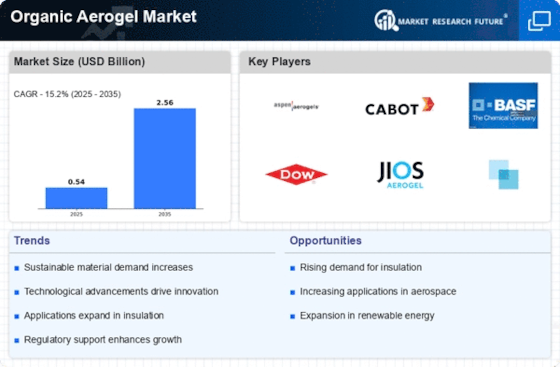Top Industry Leaders in the Organic Aerogel Market

The organic aerogel market witnesses rapid growth as industries seek lightweight and insulating materials for applications in construction, oil & gas, and automotive sectors. Organic aerogels' superior thermal insulation properties and eco-friendly composition drive their adoption across various industries, propelling market expansion.
Strategies Adopted by Key Players:
Companies in the organic aerogel market employ various strategies to gain a competitive edge:
-
Differentiation: Companies emphasize unique features of their products, such as specific thermal conductivity levels, biodegradability, or tailored pore sizes, to cater to specific customer needs. -
Cost Leadership: Focusing on efficient manufacturing processes and strategic sourcing to offer competitive pricing, especially crucial for attracting cost-conscious customers. -
Niche Targeting: Companies may specialize in specific applications like building insulation or aerospace materials, allowing them to build expertise and command higher prices within that niche. -
Partnerships and Collaborations: Collaborating with research institutions or end-user industries can accelerate innovation, overcome technical challenges, and expand market reach. -
Sustainability Focus: Highlighting the environmentally friendly nature of organic aerogels compared to traditional materials resonates with customers increasingly concerned about sustainability.
Factors Influencing Market Share:
Several factors influence market share in the organic aerogel market:
-
Production Capacity and Costs: Companies with larger production capacities and lower production costs can offer more competitive pricing and cater to larger customer demands. -
Product Innovation and Differentiation: Companies that consistently develop new and improved products with unique features stand out in the market and attract customers seeking specific functionalities. -
Brand Recognition and Reputation: Established players with strong brand recognition and a proven track record hold an advantage in attracting new customers. -
Distribution Network and Sales Channels: Companies with efficient distribution networks and established relationships with key industries can reach a wider customer base. -
Compliance with Regulations and Standards: Meeting relevant safety, environmental, and performance standards is crucial for gaining market acceptance and avoiding potential regulatory hurdles.
Key Companies in the Organic Aerogel market include
- Aspen Aerogels (US)
- Cabot Corporation (US)
- Aerogel Technologies (US)
- Nanotech Co. Ltd. (China)
- Armacell (Germany)
- Guangdong Alison Hi-Tech (China)
- Active Aerogels (Portugal)
- Enersens (France)
- JIOS Aerogel (South Korea)
- BASF (Germany)
Recent Development
August 2023: Aspen Aerogels, a prominent player, announced the construction of a new state-of-the-art manufacturing facility in Georgia, USA, indicating their commitment to expanding production capacity and meeting growing demand.
September 2023: Active Aerogels, a European company, secured funding to develop new production processes for cost-effective organic aerogel production, potentially disrupting the market with more accessible pricing.
October 2023: BASF, a major chemical company, entered the organic aerogel market with the launch of its Aerogel product line, aiming to leverage its existing resources and distribution network to gain a foothold.
November 2023: Enersens, a French company, partnered with a leading construction firm to utilize organic aerogels in building insulation projects, showcasing the material's potential in the construction sector.
December 2023: JIOS Aerogel, a South Korean company, announced a collaboration with a research institute to develop organic aerogels with enhanced fire-resistant properties, addressing a crucial limitation for wider adoption.











